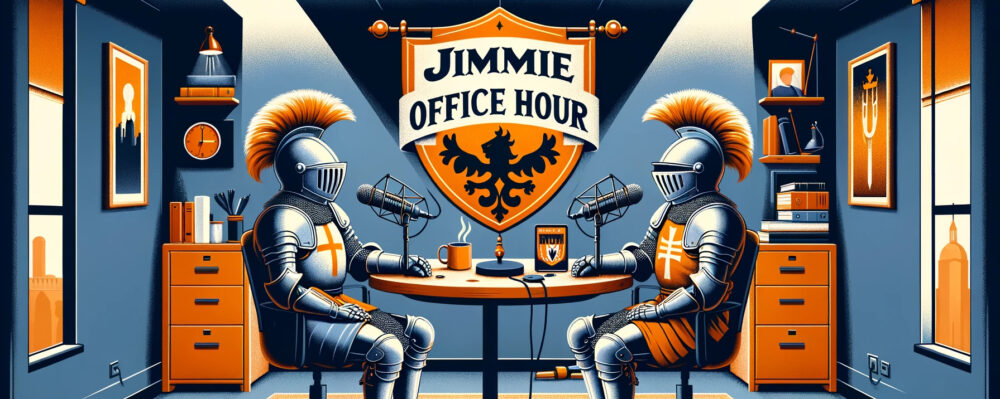
Hosts: Scot Loyd and Jakob Barnard
- Scot Loyd, Assistant Professor of Communication Studies and Speech and Debate Coach at the University of Jamestown
- Jakob Barnard, Assistant Professor, Chair of the Computer Science Department, and Director of Online Technology Programs at the University of Jamestown
In this episode of “Jimmie Office Hour,” we celebrate the launch of this new podcast by covering the inspiration behind it, dive into application, and cover the importance of a liberal arts education in higher education.
Key Discussions:
- Introduction to the Podcast:
- Purpose: Discuss issues surrounding liberal arts education and its evolution.
- Background: Hosts introduce themselves and their roles at the University of Jamestown.
- Integration of Computer Technology in Liberal Arts:
- Historical Perspective: Discussion on how computer science has always been linked to liberal arts since the 1970s.
- Modern Relevance: Technology is now embedded in all aspects of liberal arts, making it indispensable in various classical liberal arts fields like mathematics, music, and rhetoric.
- Educational Impact: Technology enhances the learning and application of these disciplines, creating a need for students to be technologically adept.
- Challenges and Changes in Education:
- Transformation of Higher Education: The landscape of higher education is changing, requiring adaptation in teaching methods and curriculum.
- Student Preparedness: Emphasis on the necessity for students to develop both technical skills and soft skills such as communication and critical thinking.
- AI and Technology: The rise of AI and its implications on programming and other technical fields. The need for students to understand and adapt to new technologies while retaining foundational skills.
- Importance of Liberal Arts:
- Broad-Based Learning: A liberal arts education provides a well-rounded foundation, enabling students to tackle various challenges and adapt to different fields.
- Communication Skills: Vital for success in any field. The ability to articulate ideas clearly is emphasized as a key component of a liberal arts education.
- Future of Liberal Arts:
- Curriculum Evolution: The need to constantly reassess and update the liberal arts curriculum to stay relevant and inclusive of new perspectives.
- Critical Thinking and Debate: Encouraging students to engage in debates and discussions to hone their critical thinking skills and broaden their understanding of complex issues.
- Addressing ROI Concerns:
- Value of Education: Addressing the perception that a liberal arts education may not offer a tangible return on investment.
- Flexibility and Application: A liberal arts degree is versatile, providing a broad skill set that can be applied to various career paths.
- Real-World Preparation: Highlighting the importance of preparing students for real-world challenges through a diverse and comprehensive educational experience.
Conclusion:
The podcast underscores the significance of a liberal arts education in developing well-rounded individuals equipped with both technical and soft skills. The discussion emphasizes the evolving nature of education and the importance of adapting to new technologies while maintaining a strong foundational knowledge base. The episode concludes by encouraging listeners to share the podcast and continue engaging in conversations about the future of liberal arts education.

